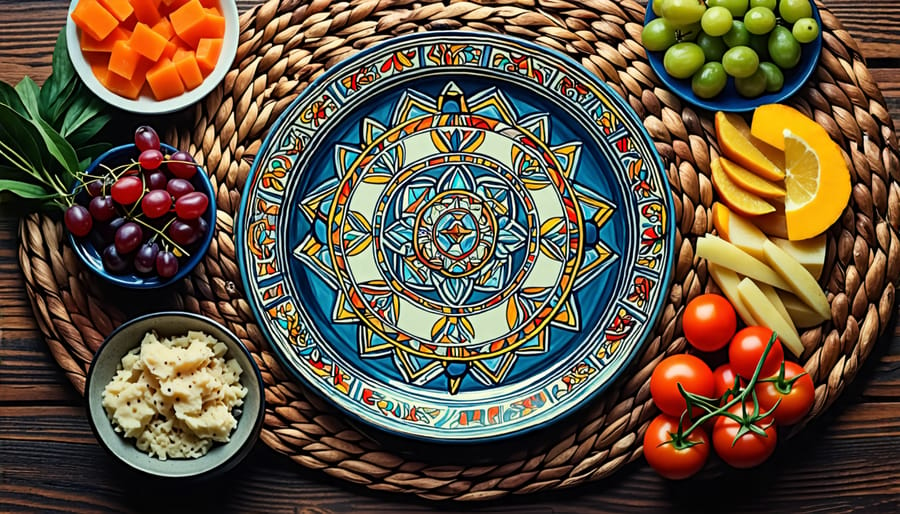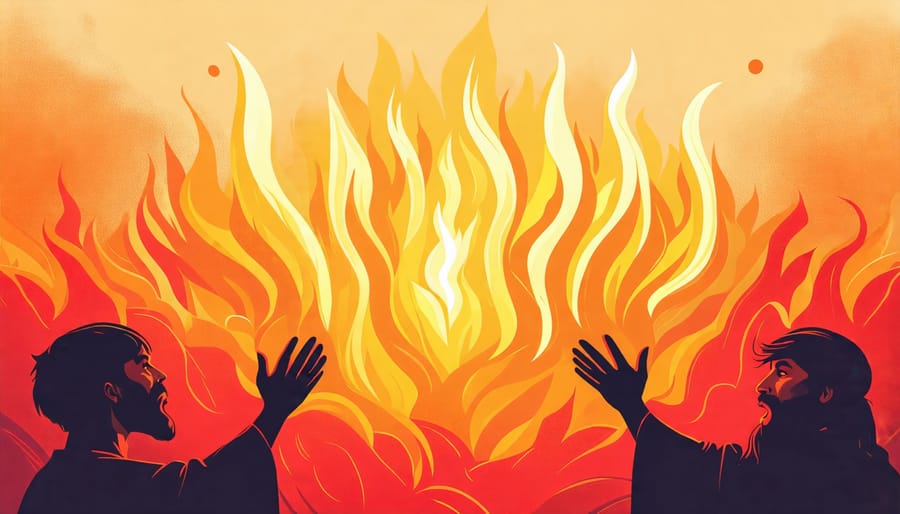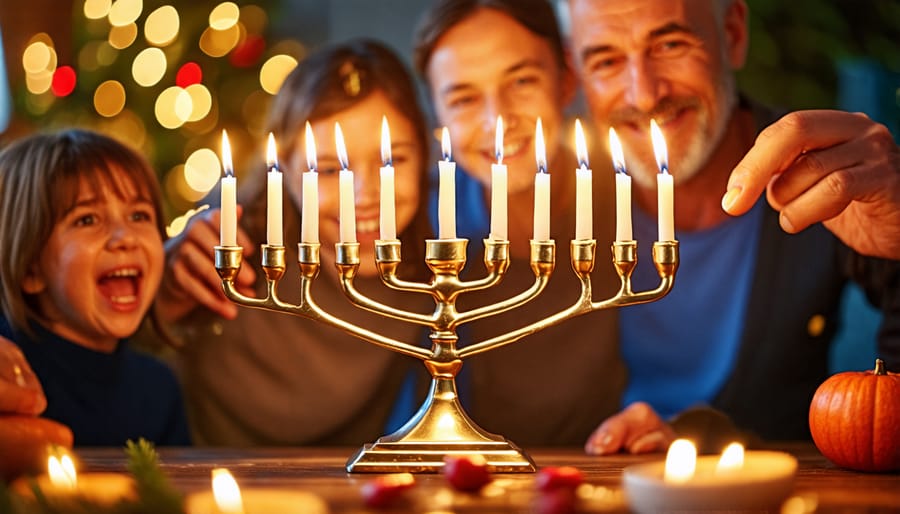Embark on a captivating journey through the biblical holidays calendar, where ancient traditions intertwine with profound spiritual significance. From the solemn introspection of Yom Kippur to the joyous celebration of Passover, each sacred observance invites Christians to deepen their faith and connect with the rich tapestry of their religious heritage. As we explore the major biblical holidays, discover how these timeless rituals can infuse your life with renewed meaning, purpose, and a profound sense of connection to the divine. Whether you are a lifelong believer or a curious seeker, this illuminating exploration will inspire you to embrace the transformative power of the biblical holidays and cultivate a deeper, more vibrant relationship with God.

Passover and the Feast of Unleavened Bread
Biblical Roots
The biblical roots of Passover trace back to the Exodus story, where God delivered the Israelites from slavery in Egypt. As described in Exodus 12, God instructed the Israelites to sacrifice a lamb and apply its blood to their doorposts, causing the Angel of Death to “pass over” their homes during the tenth plague. The Lord then commanded the Israelites to commemorate this event annually as a lasting ordinance (Exodus 12:14). Passover serves as a powerful reminder of God’s faithfulness, protection, and redemptive power in the lives of His people. By celebrating this biblical holiday, Christians honor the rich heritage of their faith and recognize Jesus Christ as the ultimate Passover Lamb (1 Corinthians 5:7), whose sacrifice delivers us from the bondage of sin and death.
Christian Significance
Jesus’ Last Supper, where He shared the Passover meal with His disciples, holds profound spiritual significance for Christians. During this sacred gathering, Jesus revealed that the Passover elements of unleavened bread and wine symbolized His own body and blood, which would be sacrificed for the redemption of humanity (Matthew 26:26-28). Just as the Passover commemorated God’s deliverance of the Israelites from bondage in Egypt, Jesus’ death and resurrection would deliver believers from the bondage of sin and death. The timing of Jesus’ crucifixion during the Passover festival was no coincidence; He became the ultimate Passover Lamb, whose sacrifice atoned for the sins of the world (John 1:29). Through faith in Christ’s finished work on the cross, Christians experience the true spiritual freedom and salvation that the Passover foreshadowed. The Lord’s Supper, celebrated by believers today, stands as a powerful reminder of Jesus’ loving sacrifice and the new covenant established through His blood.
Pentecost (Shavuot)
Old Testament Meaning
In the Old Testament, Shavuot was celebrated as an agricultural festival marking the end of the grain harvest. It was one of three pilgrimage feasts when the Israelites would bring their firstfruits to the Temple as an offering to God (Exodus 23:16). Shavuot also commemorates the giving of the Torah at Mount Sinai, a pivotal moment in Israel’s covenant relationship with God. Fifty days after the Exodus, God revealed His law to Moses, establishing a sacred bond with His chosen people (Exodus 19-20). The Feast of Weeks, as Shavuot is also known, celebrates this divine gift that has guided and shaped the lives of believers for generations, reminding us of God’s faithfulness and the importance of living according to His Word.
The Coming of the Holy Spirit
On the day of Pentecost, as recorded in Acts 2, the Holy Spirit descended upon the disciples in Jerusalem, fulfilling Jesus’ promise to send a Helper. The Spirit came as a mighty wind and tongues of fire, empowering the disciples to speak in various languages and boldly proclaim the gospel. This transformative event marked the birth of the early church, as 3,000 people were added to their number that day. The coming of the Holy Spirit equipped the believers with spiritual gifts, unity, and courage to spread the good news of Christ’s resurrection and salvation to the ends of the earth, forever changing the course of history and establishing the global Christian community we know today.

The Fall Feasts
Rosh Hashanah
Rosh Hashanah, also known as the Feast of Trumpets, is a sacred time of introspection and repentance for believers. This biblical holiday serves as a powerful reminder to examine our hearts and turn back to God. The sounding of the shofar, a ram’s horn, is a clarion call to awaken our spirits and renew our commitment to living righteously. As we reflect on the past year and seek forgiveness for our shortcomings, we are filled with hope and anticipation for the future. Rosh Hashanah presents an opportunity to start anew, with a clean slate and a renewed sense of purpose. By setting aside time for prayer, meditation, and self-reflection, we open ourselves to the transformative power of God’s love and grace. This holy day invites us to deepen our relationship with the Almighty and embark on a path of spiritual growth and renewal.
Yom Kippur
Yom Kippur, the Day of Atonement, is a solemn yet profoundly meaningful biblical holiday. It is a time for deep introspection, repentance, and seeking forgiveness from God and others. On this day, we are called to humble ourselves before the Lord, acknowledging our sins and shortcomings, and asking for His mercy and grace. Through fasting, prayer, and acts of charity, we seek to repair our relationships with God and our fellow human beings. Yom Kippur reminds us of the incredible power of forgiveness and the restoration that is possible through God’s love. As we confess our sins and turn back to Him, we experience the joy of being cleansed and made whole once again. This sacred day invites us to let go of the past, to make amends, and to start anew with a clean slate, walking in the light of God’s abundant grace.
Sukkot
The Feast of Tabernacles, or Sukkot, is a joyful celebration of God’s faithful provision for His people during their wilderness journey. For seven days, families construct temporary shelters called sukkot, reminiscent of the Israelites’ dwellings in the desert. This biblical festival encourages gratitude for God’s abundant blessings and protection. Worshippers gather to share meals, sing praises, and rejoice in the Lord’s goodness. Sukkot also points to the future ingathering of all nations under God’s eternal shelter, where joy and peace will reign forevermore.
Hanukkah and Purim

The Miracle of Hanukkah
The story of Hanukkah, also known as the Festival of Lights, begins in the 2nd century BCE during the Maccabean Revolt. The Jewish people, led by Judah Maccabee and his brothers, fought against the oppressive rule of the Seleucid Empire, which had desecrated the Holy Temple in Jerusalem. After a hard-fought battle, the Maccabees reclaimed the Temple and sought to rededicate it to God. However, they found only enough pure olive oil to light the Temple’s menorah for one day. Miraculously, the oil lasted for eight days, providing enough time to prepare more pure oil. This miraculous event is commemorated during the eight-day celebration of Hanukkah, which reminds us of God’s faithfulness and provision. As Christians, we can Celebrate Christian Holidays while also appreciating the rich history and spiritual significance of Hanukkah, recognizing the shared heritage of our faith and the enduring power of God’s love and light in the face of darkness.
The Triumph of Purim
In the Book of Esther, we witness a remarkable display of God’s sovereignty and the power of faith. Queen Esther, a Jewish woman, courageously risked her life to save her people from the wicked plot of Haman, a high-ranking official in the Persian court. Guided by her cousin Mordecai, Esther approached King Ahasuerus uninvited, revealing her Jewish identity and exposing Haman’s evil scheme. Through prayer, fasting, and unwavering trust in God, Esther became an instrument of deliverance. In a stunning reversal, Haman’s plan to destroy the Jews was thwarted, and he faced the very fate he had intended for God’s people. The story of Purim reminds us that even in the darkest of times, God is at work behind the scenes, using the bravery and faith of His servants to bring about victory and redemption. As we celebrate this joyous holiday, let us remember that God is always in control and will never abandon His children.
Conclusion
Celebrating biblical holidays is a profound way for Christians to deepen their faith and connect with the rich tapestry of God’s redemptive work throughout history. As we observe these sacred days, we are reminded of the incredible love and faithfulness of our Heavenly Father, who has been working tirelessly to restore our relationship with Him since the beginning of time. By participating in the traditions and rituals associated with each holiday, we not only honor the sacrifices made by our spiritual ancestors but also gain a greater appreciation for the unfolding story of salvation that culminates in the life, death, and resurrection of Jesus Christ. Through these celebrations, we are drawn closer to the heart of God and inspired to live out our faith with renewed passion and purpose, knowing that we are part of a grand narrative that transcends time and space, ultimately leading us to our eternal home in His presence.
